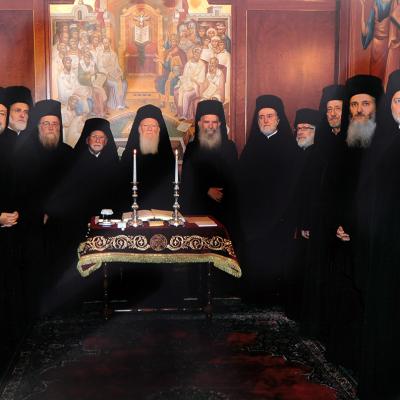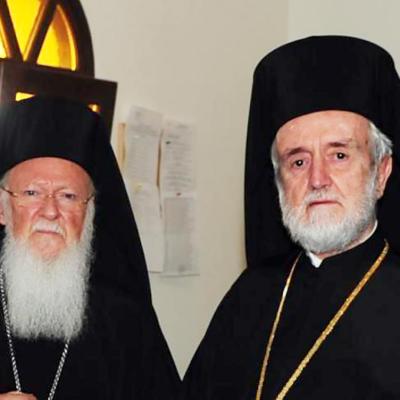Throughout his extensive tenure serving the Church, Metropolitan John Zizioulas of Pergamon has been a beacon of dedication and commitment. In his distinguished role, not only as a member of the Academy of Athens but also as its president in 2002, he took on paramount responsibilities. As an adviser to the Ecumenical Patriarch, he undertook critical missions that spanned from visiting local Orthodox Churches, engaging with the Vatican, interacting with the Anglicans, representing at the World Council of Churches, organizing and attending the major ecological conferences of the Ecumenical Patriarchate, and playing a significant role in the official dialogue with the Catholic and Anglican Church. Furthermore, as the culmination of his service, he was instrumental in the preparations and realizations of the Holy and Great Synod.
Metropolitan John's unwavering commitment to the Ecumenical Patriarchate has always been underpinned by his deep theological passion for the Church's unity. This devotion is why his involvement in the Holy and Great Synod in Crete (2016) was not just vital but also transformational, steering it towards its realization. His contributions have left an indelible mark on the Church and its pursuit of unity.
Metropolitan of Pergamon John Zizioulas sacrificially ministered the sacred institution of the Ecumenical Patriarchate (many times he worried and did not sleep at night until he found the proper and viable solution for the ecclesiastical problems faced by the Church of Constantinople) and believed that this institution is the expression of ecumenical idea of Christianity and Hellenism and the minister of the unity of the local Churches, which is expressed through the synodical institution.
In 1986, due to the desire of the Ecumenical Patriarchate to have a theological consultant and representative with worldwide clout, according to ancient practice, as in the case of Sts. Tarasios and Photios, Zizioulas was ordained for one day a deacon, the next day a priest, and finally, on the third day (June 17), he was ordained and enthroned as the Metropolitan of Pergamon. (see Election and Ordination). He immediately represented the Ecumenical Patriarchate at pan-Orthodox and pan-Christian forums and ecumenical dialogues.
He formulated the relations between Constantinople and other Orthodox Churches in the following way: “This is the golden rule in the relations between Constantinople and the rest of the Orthodox Churches in the light of Orthodox ecclesiology. The Orthodox Churches need a primus; they must do nothing that pertains to the Orthodox Church as a whole without him. Equally however, this primus must do nothing without the other Churches in what pertains to Orthodoxy as a whole. The Patriarch of Constantinople is and must continue to be the one and only mouth with which Orthodoxy speaks as a whole. He can only do that by acting in consultation and communion with the other Orthodox Churches. This makes Orthodox primacy both necessary and free from ‘papalism’.”
For the lost eucharistic unity between East and West, he worked for many years in the Inter-Christian Organizations and mainly in the World Council of Churches. His theology of the Eucharist greatly influenced the theology and the understanding of the Church of the heterodox members of the Council. The Pope called him “the greatest theologian of Christianity.” Also great was his contribution to the official Theological Dialogue between the Orthodox and Roman Catholic Churches and the Dialogue between the Orthodox and Anglican Churches.
A major contribution was his role as president of the 4th and 5th Pan-Orthodox Pre-Conciliar consultations held in Chambésy (Geneva) as preparation for the Holy and Great Council, which convened in Crete in 2016. As mentioned by His Holiness Ecumenical Patriarch Bartholomew: “Metropolitan John took the lead in all the important events of our humble Patriarchate, with the highlight being his participation in the work of the Holy and Great Synod of the Orthodox Church as a prominent member of the Patriarchal Representation and first advisor to the President of the Synod.”
Despite the profound and insightful prophetic theological contributions of the late Hierarch, which inspired countless theses, and despite his myriad distinguishing attributes — intelligence, sharpness, adaptability, profound insight, and diplomatic savvy — Elder Metropolitan John remained a figure of humility and modesty. He was wholly dedicated to serving the Church Body. Even though he was not native to Constantinople, he epitomized the essence of a true Phanariot Hierarch. In his demeanor and countenance, one could discern the hallmarks that define a Phanariot Hierarch: deep scholarship, an aristocratic yet unpretentious bearing, genuine simplicity, and paramount among all, an unwavering ecclesiastical ethos.
Significant from an international point of view was his role in ecological matters. He proposed at a conference on Patmos in 1988 that September 1st be dedicated as a day of prayer for the protection and preservation of the natural environment. This proposal was after that adopted by the World Council of Churches and the Conference of European Churches, as well as the Roman Catholic and Anglican Churches. Starting in 1995, as co-chair of the Religion and Science Committee of the Ecumenical Patriarchate, he initiated a series of international, interfaith, and interdisciplinary symposia on the environment that took place on ships sailing major seas and rivers to raise awareness of the ecological crisis. All this activity led to the now internationally acknowledged role of the Ecumenical Patriarch as the “Green Patriarch.” Related to these activities, Metropolitan Zizioulas also served as president of the Inter-Orthodox Committee on the Protection of the Environment and as president of the Inter-Orthodox Committee on Bioethics.




